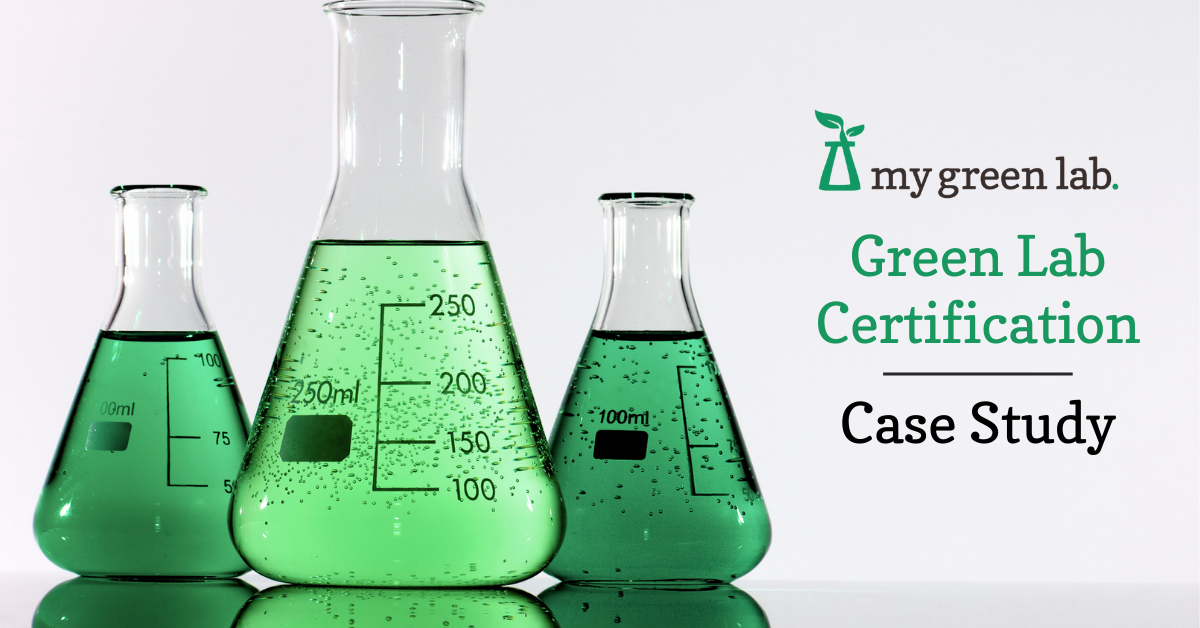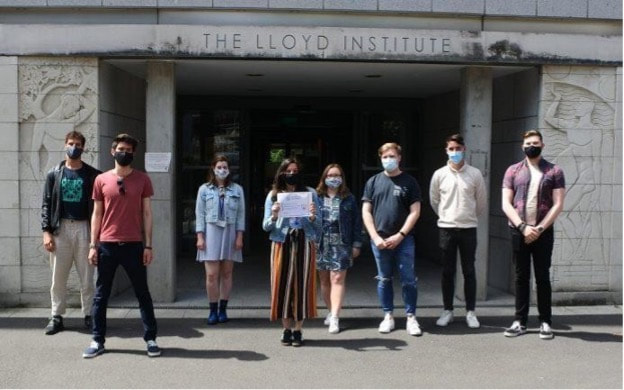How Green Lab Certification Helped Trinity College Dublin Establish a Culture of Sustainability6/30/2021
Working with My Green Lab, The Trinity College Institute of Neuroscience received the Platinum Green Lab Certification in recognition of their efforts to include sustainable best practices in the lab.
By providing actionable ways to make real and impactful environmental changes across their laboratory, the Green Lab Certification helped the team at Trinity College Institute of Neuroscience (TCIN) in Ireland establish a culture of sustainability. In this article, we capture their journey and its impact in their own words.
A Desire for Change “Before starting the Green Lab Certification program, the TCIN team had been striving to engage lab personnel with environmentalism in the lab. We were more than ready to start the conversation about sustainability at the college level”, says Camilla Roselli, a Ph.D. candidate who has been leading the charge on sustainability at Trinity College Dublin (TCD). In the words of Oisín Joyce, another Ph.D. candidate and a TCD Lab Sustainability Advocate, “the guidance and knowledge surrounding sustainability among scientists and laboratory professionals was not apparent for early career researchers.” “I recalled crazy statistics about lab waste and sustainability in the back of my mind,” says Joyce. “On a global platform, research labs are known to consume 10x as much energy as office space of similar size, 4x the amount of water, and lead to the production of 5.5 million tonnes of plastic waste each year, equating to around 2% of the world’s plastic production.” Armed with the knowledge that the Green Lab Certification would help TCIN establish more sustainable practices, Joyce, Roselli, and the team engaged with My Green Lab to learn new ways to reduce the environmental impact of their lab. “We wanted to get as many people involved in the Green Lab Certification program as possible,” Roselli adds. Working Together to Make a Difference A working group with representatives from various research groups in the institute was established at TCIN to begin their certification. They formed a Green Lab committee comprising scientists, staff, director, deputy director, and operations manager. The committee met monthly to present findings and proposed plans to introduce new ways to target each certification section. “Whether that was water, energy, or plug load, we aimed to boost our green efforts and tick all the boxes before achieving our certification,” says Joyce. “We went from making minor changes such as creating a traffic light system for switching on and off lab equipment to progressively larger tasks such as regularly defrosting freezers and lowering the temperature from -80°C to -70°C.” More than 50 people partook in the changes made to achieve the Platinum level certification throughout the process. The journey towards their certification began with a survey, which all lab members completed in August of 2020. Once they received their survey results with an overall score of 44% in September 2020, they went to work, extensively researching ways to improve their score and, in turn, their lab sustainability. “My Green Lab provided us with the foundation and direction to make changes to our day-to- day lab behaviors alongside our research to achieve our greener research goals." “When implementing the prescribed changes and behavioral alterations to our work and research, we noticed a trend of sustainability wash over the institute, with people bringing new and exciting ideas to each monthly meeting,” says Joyce. Questions such as “can we share some of our materials with those in the lab next to us,” and “can we order together to reduce plastic and packaging waste” were being adopted amongst teaching and research facilities. Prof. Andrew Harkin, Associate Professor of Pharmacology and co-director of TCIN, adds that “expectations grew when the project attracted interest and support, particularly from the laboratory researchers. This initiative helped develop a community of practice and changing mindset.” After taking their second survey in May 2021, TCIN received an overall score of 70%, resulting in a Platinum Green Lab Certification. The Benefits of Lab Sustainability Joyce believes that the MGL Green Lab Certification is essential as it provides a quantifiable metric of their sustainable efforts and successes in the lab, as well as their outreach and resourcefulness as researchers in Trinity College Dublin and Ireland. During the certification process, the TCIN Green Labs committee developed a Trinity Green Labs Guide, that showcased all of their current eco-friendly practices and lab sustainability research. It also highlighted the changes towards sustainability that TCIN aimed to make in the future. The benefits of achieving the Green Lab Certification also stretched beyond campus. Joyce describes the certification process as one of “an overarching sense of accomplishment, metamorphosis, and community.” He continues, “the process has enabled the committee to engage with a wide range of people from private companies to help with recycling Styrofoam and local sports clubs and the university gym for repurposing cold packs in the case of sporting injuries.” “This program permitted us to become an active player in a global initiative and become more sustainable in health science research, putting Ireland's emerald isle on the map and making TCIN the first in Trinity College Dublin and the second in Ireland to achieve this status.” As per Roselli, “Everyone thinks twice before using single-use plastic or wasting water, and finally, everyone is engaged in making the lab a greener place, while before, just a few people were involved.” Looking Forward Trinity College Dublin has committed to being carbon neutral by 2030, and there is no doubt that labs will have an enormous impact on meeting that goal. Recent measures, including installing water fountains, communal scanners & printers, and engaging with estates and facilities on the provision of parking facilities for bicyclists, are helping build a culture of sustainability. Completing the Green Lab Certification is helping to shape Trinity College’s long-term sustainability goals. “With a more connected network of advocates for green research throughout TCIN, we can bulk order supplies, share excess reagents, and include green lab practices and waste management during the orientation process for incoming students and researchers,” says Joyce. “I think the MGL program will positively impact my lab in a long way. Both from an environmental point of view and from an economic point of view,” Roselli continues. “Seeing the fruits of our labor amount to a tangible and recognizable entity was an achievement shared by all those involved. One that I hope all other labs and research centers get the privilege of experiencing.”
Are you inspired to start your lab’s sustainability journey? Learn more about MGL’s Green Lab Certification here.
Comments are closed.
|
Sign Up for Our Newsletter! |
Contact UsCopyright 2013-2024 My Green Lab®, all rights reserved.
About My Green LabMy Green Lab® is a 501c3 non-profit organization.
All gifts are tax deductible in accordance with IRS regulations. |


